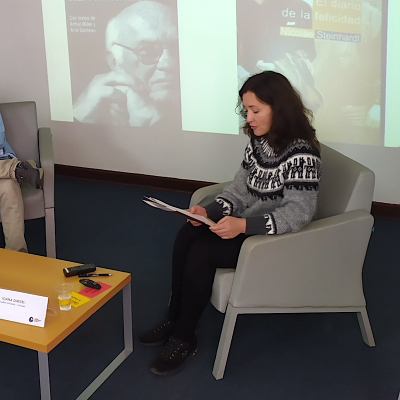Dimitriu and the Power of Storytelling

Spanish Instructor Ioana Dimitriu participated in the International Colloquium on Autofiction, which took place at Pontificia Universidad Católica del Perú from November 4th to 6th, 2019, with a paper titled “La literatura y la salud mental: sobrevivir narrando y para narrar, en dos experiencias carcelarias” (Literature and Mental Health: Surviving by Telling Stories and to Tell the Story, in Two Prison Experiences.)
In her research on testimonial writings, Dimitriu focussed on memoirs of former political prisoners of totalitarian regimes, prominent intellectuals who were victims of the military dictatorship in Argentina and of the Communist regime in Romania. In this context, she looked at the role of humanities in man’s upbringing, and specifically at how a vast background in languages and literatures nourishes and strengthens the human person in times of crisis, by being not only a means of escape, but also by empowering someone to fight for freedom.
Taking as a starting point Paul Ricoeur’s statement that “Our own existence cannot be separated from the way we can give an account of ourselves,” as well as Jorge Volpi’s opinion that “fiction fulfills an indispensable task in our survival,” Dimitriu examined the way literature–and specifically the act of telling stories, composing and reciting poems and setting up drama plays—had a positive impact on the mental state of the protagonists, helping them survive in a sordid prison environment. They explicitly mentioned how knowledge of foreign languages and literatures played a significant role in helping them cope with pain caused by torture, hunger and cold, how they found joy in sharing their love of languages and literatures with those around them—either inmates or guards—and how living with the hope to one day write their own life stories motivated them to stay alive. They lived by telling stories and to tell the story; they were nourished by languages and literatures, and they fed others through their literary testimonies, which they wrote in their mother tongues. This mise en abyme of language and literature grows exponentially throughout the two memoirs, with every intertext, with every metatext, and with every reading of ours. Since we as readers are part of this phenomenon, then the therapeutic effect of learning languages and of reading and producing literature expands to us as well.
When experiencing traumatic events, resorting to languages, literatures, film, history, and theology, among other areas of the arts and the humanities, has a therapeutic effect. The question is how do we convince our students that by studying them they get better equipped to face life’s challenges?